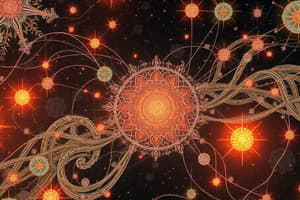Podcast
Questions and Answers
What happens when the north pole of one magnet is placed near the south pole of another magnet?
What happens when the north pole of one magnet is placed near the south pole of another magnet?
They will attract each other.
What is a lodestone and why is it significant?
What is a lodestone and why is it significant?
A lodestone is a natural magnet that can attract metals, and it was discovered by a Greek shepherd named Magnes.
Why are compasses important for sailors?
Why are compasses important for sailors?
Compasses help sailors determine direction when they are out at sea.
What materials are considered magnetic, and give an example?
What materials are considered magnetic, and give an example?
What is the purpose of cow magnets?
What is the purpose of cow magnets?
What role do magnets play in hard drives?
What role do magnets play in hard drives?
How do MRI machines utilize magnets?
How do MRI machines utilize magnets?
Describe the function of magnets in maglev trains.
Describe the function of magnets in maglev trains.
What is the significance of magnetic strips in credit cards?
What is the significance of magnetic strips in credit cards?
How do magnets function in electric motors?
How do magnets function in electric motors?
Flashcards are hidden until you start studying
Study Notes
Magnets & Their Properties
- Magnets have two poles: a north pole and a south pole.
- Opposite poles attract, while like poles repel.
- The force of attraction or repulsion between magnets is called magnetic force.
History of Magnets
- Lodestone: A naturally occurring magnetic rock discovered by a Greek shepherd named Magnes.
- Compass: Invented by the Chinese using a lodestone shaped like a spoon.
- William Gilbert: Discovered that Earth is a giant magnet.
Types of Materials
- Magnetic Materials: Materials attracted to magnets (e.g., iron, nickel, steel).
- Non-magnetic Materials: Materials not attracted to magnets (e.g., gold, aluminum, copper, wood, glass, plastic).
Uses of Magnets
- Mining: Used to separate magnetic minerals from non-magnetic ones.
- Livestock: "Cow magnets" prevent hardware disease in cows by attracting and collecting ingested metal.
- Electronic Devices:
- Hard Drives: Store data using magnetic fields.
- Speakers and Microphones: Convert electrical signals into sound waves and vice versa.
- Medical Equipment:
- MRI Machines: Use strong magnetic fields to create images of the body's organs and tissues.
- Transportation:
- Maglev Trains: Float above the tracks using magnetic repulsion.
- Other Uses:
- Credit Cards: Contain magnetic strips for storing information.
- Doorbells: Some types generate a ringing sound using magnets.
- Electric Motors: Convert electrical energy into mechanical energy using magnets.
- Magnetic Locks: Secure doors and gates.
- Refrigerator Magnets: Use magnets to stick to refrigerators.
- Compass Needles: Magnets that point north.
Studying That Suits You
Use AI to generate personalized quizzes and flashcards to suit your learning preferences.




